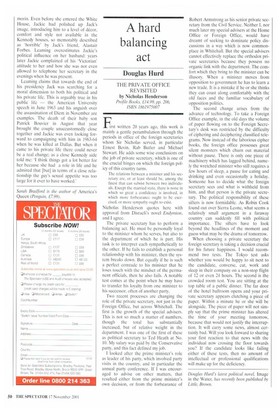A hard balancing act
Douglas Hurd
THE PRIVATE OFFICE REVISITED by Nicholas Henderson
Profile Books. £14. 99, pp. 206, ISBN 1861975007
First written 20 years ago, this work is mainly a gentle perambulation through the periods in office of the foreign secretaries whom Sir Nicholas served, in particular Ernest Bevin, Rab Butler and Michael Stewart. He adds some wise conclusions on the job of private secretary, which is one of the crucial hinges on which the foreign policy of this country turns.
The relations between a minister and his secretary are, or at least should be, among the finest that can subsist between two individuals. Except the married state, there is none in which so great a confidence is involved, in which more forbearance ought to be exercised, or more sympathy ought to exist.
Nicholas Henderson quotes here with approval from Disraeli's novel Endymion, and I agree.
The private secretary has to perform a balancing act. He must be personally loyal to the minister whom he serves, but also to the department of which he is part. His task is to interpret each sympathetically to the other. If he fails to establish a personal relationship with his minister, then the system breaks down. But equally if he is such a perfect comrade to his minister that he loses touch with the mindset of the permanent officials, then he also fails. A notable test comes at the point when he may have to transfer his loyalty from one minister to his successor, often of another party.
Two recent processes are changing the role of the private secretary, not just in the Foreign Office, but across Whitehall. The first is the growth of the special advisers. This is not so much a matter of numbers, though the total has substantially increased, but of relative weight in the department. I was one of the first of these as political secretary to Ted Heath at No. 10. My salary was paid by the Conservative party, and this fact defined my job.
I looked after the prime minister's role as leader of his party, which involved party visits in the country, and in particular the annual party conference. If I was encouraged to advise on other matters, that resulted either from the prime minister's own decision, or from the forbearance of Robert Armstrong as his senior private secretary from the Civil Service. Neither I, nor much later my special advisers at the Home Office or Foreign Office, would have dreamt of seeking to dominate policy discussions in a way which is now commonplace in Whitehall. But the special advisers cannot effectively replace the orthodox private secretaries because they possess no organic link with the department. The comfort which they bring to the minister can be illusory. When a minister moves from opposition to government he has to learn a new trade. It is a mistake if he or she thinks they can coast along comfortably with the old faces and the familiar vocabulary of opposition politics.
The second change arises from the advance of technology. To take a Foreign Office example, in the old days the volume of paper flowing on to the Foreign Secretary's desk was restricted by the difficulty of ciphering and deciphering classified telegrams. Now instead of the laborious cipher books, the foreign office possesses great silent monsters which churn out material without pause. There is only one piece of machinery which has lagged behind, namely the wretched minister who still requires a few hours of sleep, a pause for eating and drinking and even occasionally a holiday. Someone has to decide what the foreign secretary sees and what is withheld from him, and that person is the private secretary. The political responsibility of these sifters is now formidable. As Robin Cook found out over Sierra Leone, what seems a relatively small argument in a faraway country can suddenly fill with political importance. The sifters have to look beyond the headlines of the moment and guess what may be the drama of tomorrow.
When choosing a private secretary the foreign secretary is taking a decision crucial for his future happiness. I would recommend two tests. The Tokyo test asks whether you would be happy to sit next to the candidate, converse, eat, work and sleep in their company on a non-stop flight of 12 or even 24 hours. The second is the crowded room test. You are sitting at the top table of a public dinner. The far door of the hotel ballroom opens and your private secretary appears clutching a piece of paper. Within a minute he or she will be alongside. The piece of paper will not simply say that the prime minister has altered the time of your meeting tomorrow, because that would not justify the interruption. It will carry some news, almost certainly bad. Will you look forward to sharing your first reaction to that news with the individual now crossing the floor towards you? If the candidate looks like failing either of these tests, then no amount of intellectual or professional qualifications will make up for the deficiency.
Douglas Hurd's latest political novel, Image in the Water, has recently been published by Little, Brown.






















































































 Previous page
Previous page